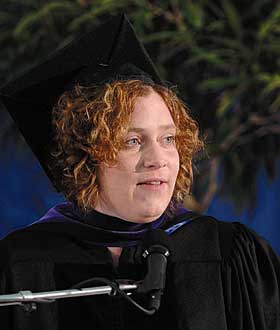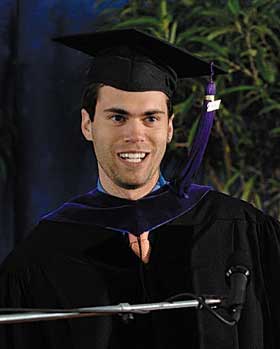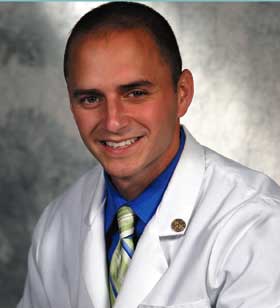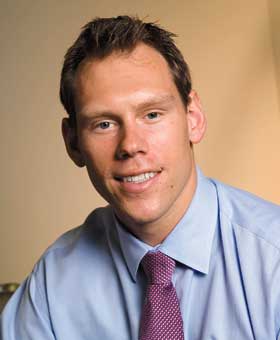  |
| HOME | THIS ISSUE | CALENDAR | GRANTS | BACK ISSUES | < BACK | NEXT > |
Medical, dental, law school students address peers at Commencement- May 29, 2007 | ||||
Christine Edwardsby Sherry Fisher
Law school felt a lot like running a marathon, Christine Edwards told graduates and guests at the law school commencement ceremony May 20. Edwards works full time at Travelers in the Claim Legal department and has an 11-year-old son. She also is a marathon runner. “The majority of us have gone through this program working full-time and raising families,” she said. “We drive in from all over the state, eat dinner from vending machines … and try to steal minutes at lunch to read cases that we will be responsible for that very same evening. “Despite all of the things seemingly stacked against us, we’ve made it, and I challenge you to find anyone better at multi-tasking, or anyone more ready to meet the demands of practicing law.” Family and friends “have gotten us through this race,” she said, “much like the aid station volunteers you would find at a marathon – those people who hand out water and energy gels, offer encouragement, and call an ambulance when you just can’t walk another step.” Edwards said she is grateful for the friends she made. “We have had an incredible, binding, common experience,” she said. “We cheered each other on when we had done well, and offered encouragement to one another when things didn’t quite go our way.” She said the law school offers students incredible opportunities. “There is a diverse curriculum with many different specialties. You can’t possibly sample them all.” Edwards earned a bachelor’s degree in sociology from Eastern Connecticut State University, and an MBA from the University of New Haven. “But I always wanted to go to law school,” she said. She spent her first year of law school at Western New England College, School of Law. At UConn, she participated in the Criminal Clinic Trial Division, a year-long course. “We were able to go to court and gain practical litigation experience, while helping defendants who didn’t have a lot of resources available to them,” she said. Edward says for now she is focusing on passing the bar exam, and is weighing her options as to where to begin her legal career.
Robert Dunnby Sherry FisherIt’s not surprising that Robert Dunn decided to become a lawyer.
“I remember when I was in the second grade, we played kickball at recess and the captain picked teams. One day, I was one of the first kids picked. Someone asked why I – who wasn’t particularly good at the sport – was chosen first. The captain said, ‘I’m sick of arguing with him.’” Dunn delivered remarks to the graduating class at the School of Law commencement ceremony May 20. He went to Conard High School and earned his bachelor’s degree at Holy Cross College in history and political science. “I was really interested in both subjects,” he says. “I’ve always enjoyed reading history books, and I’ve always been fascinated by politics. The two majors meshed well.” Dunn says law school requires stamina and commitment. “The first semester was consuming,” he says. “Then it eased up a bit. I think the biggest lesson I learned is that hard work is the key to success. Putting in the hours. It’s not just about innate talent; that only takes you so far.” Dunn is inspired by people who are “passionate about goals and willing to make sacrifices,” he says. “I’m intrigued and inspired by people who work hard and enjoy their success.” He says he will always treasure the friends he made at UConn. “I have been truly lucky to meet an incredible group of people and spend three years with them,” he says. Next year, he will be working at the law firm of Skadden, Arps, Slate, Meagher and Flom in New York City. Daniel Colonnoby Jane Shaskan
Just before his junior year at Middlebury College, Daniel Colonno decided to change his major from American literature to pre-med and pursue a career in medicine.
“I sought a career that would allow me to combine interests in humanities and science, with people and their stories being just as important as the scientific fact and process.” Graduating magna cum laude from Middlebury, he accepted a scholarship from the UConn School of Medicine, where he soon became interested in physical medicine and rehabilitation, a field he found inspiring. “To work with dedication and commitment for the slowest progress and smallest functional gains can mean everything to a patient and family, and to a physician,” he says. “The process becomes the reward as much as the results.” Dunn found that the teamwork, communication, and open-mindedness in this medical field suited his nature, which he says was rooted in his background as a team athlete. He played team sports including football, wrestling, and baseball through college, and still plays pick-up games when he can and participates in marathons and triathlons. “Physical medicine and rehabilitation is built on teamwork, and I think my character and abilities will complement my work,” he says. Colonno also became interested in acupuncture. “It’s a fine-tuned idea, a rethinking of how the body works and how we look at it, and something to explore as an additional treatment option,” he says. “Sometimes those options are limited and the willingness to look for new ways to make lives better can help patients.” On a medical school elective, he traveled to China, where he studied acupuncture and traditional Chinese medicine. “The trip was incredible,” he says. “I learned about their system and culture of medicine and gained a new perspective.” During medical school, Colonno volunteered at a number of clinics, a nursing home, and at Hartford schools, where he taught health education. He has also conducted research in the area of aquatic rehabilitation related to arthritis. Colonno was the students’ choice for commencement speaker. “I’m proud to represent the class,” he says. He will stay at the UConn Health Center for an internship in internal medicine, before starting his residency next year in physical medicine and rehabilitation at the University of Washington Affiliated Hospitals in Seattle.
Justin Clemowby Jane ShaskanAs a pre-med student, Justin Clemow researched brain development at Thomas Jefferson Hospital while attending the University of Pennsylvania.
Then he met a dentist who loved his work. “He pointed out the better hours, lower insurance, and better lifestyle of dentistry compared to medicine,” says Clemow. “As an oral surgeon, I would have the best of both worlds. I also liked the idea of helping a patient right away. Fixing a smile for good oral health is important, but so is the confidence that a healthy smile brings.” While in dental school at UConn, Clemow worked in Emory University’s operating room, helped manage trauma patients at the University of Pennsylvania’s hospital, and assisted in the operating rooms and emergency departments at John Dempsey and Hartford hospitals. His most memorable experience, however, was in Riobamba, Ecuador, he says, where he performed extractions and assisted with a cleft lip repair under the supervision of Dr. Richard Topazian. “It was a moving experience,” he says. “The way they tolerated pain and gave us big hugs when the work was done. The people were so grateful. Every single person was appreciative of our help.” Clemow will attend the University of Florida College of Medicine, where he will pursue a medical degree as part of his residency in oral and maxillofacial surgery. He says the dental school has prepared him well. “The first two years were tough and we’re all thrilled it’s over, but we learned much more than graduates of other dental schools. All dental students are exposed to medicine in dental school,” he says, but UConn’s curriculum is more thorough. He expects his future will hold a combination of the things he loves about dentistry and medicine. “I’ll be working not only on implants and third molars, but also on facial trauma cases, jaw surgery, and facial reconstruction, to name a few,” he says. Clemow is an American Red Cross-certified instructor and a certified emergency medical technician. He volunteered at the student-run clinics and programs, the Red Cross, and the Madison (New Hampshire) Rescue Squad, serving as an EMT and firefighter. While in college he was a member of the varsity crew team and was awarded the All Ivy-League Academic All American Award. |
| ADVANCE HOME UCONN HOME |

 “The evening division is for endurance athletes only,” she said.
“The evening division is for endurance athletes only,” she said. “I’ve always liked to argue,” he says.
“I’ve always liked to argue,” he says. “It was an introspective decision,” says Colonno.
“It was an introspective decision,” says Colonno. After graduating with an interdisciplinary degree in the biological basis of behavior, he worked on gene-targeting and heart-related research at the university’s cardiovascular division.
After graduating with an interdisciplinary degree in the biological basis of behavior, he worked on gene-targeting and heart-related research at the university’s cardiovascular division.